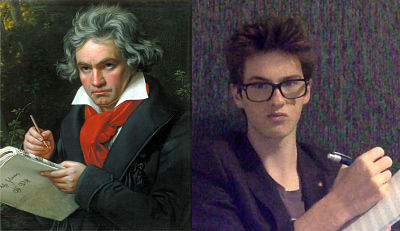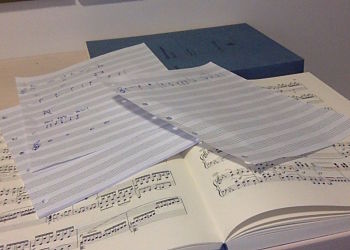There’s this joke my dad likes to tell.
Dad: What is Beethoven doing in his grave?
Anthony: …What?
Dad: He’s de-composing!
Anthony: [Groans].
Several differences exist between Beethoven and me. Notably, I am rather more alive than him. However, there are some similarities between us. We both have written music – though my music is a lot more forgettable than his, doesn’t even belong in the same sentence.
But yes, I write music. That’s why my Dad tells the above joke with such glee and regularity: he tells it for me, to gently tease me, but really to support me and to show he’s interested in what I’m passionate about.
It all started when I was quite young, maybe five or six. I was sitting down at the piano, which I was just learning how to play, with my older cousin. She asked me to try play the Harry Potter theme song; I proceeded to play it by air. I didn’t think it was anything special at the time, but the response from the others made me think that maybe this was unusual, that I had something here. And so I started spending more time at the piano. Some of it would be practising the pieces I had to learn for lessons, but a lot of it would simply be the musical equivalent of “mucking around”. I was soon remembering what I had improvised, and these ideas became pieces. Writing music was an important form of expression to me. If I was feeling happy, I would write happy music; if I was feeling cross, I would write angry, stompy music to get it off my chest. When my first cat died, I wrote a eulogy for him. Music has continued to be important to me in this way throughout my life. When it came to choosing what to study at university, I decided that composition was simply too big a part of my life for me not to continue it.
So that’s my story. That’s how I’ve ended up where I am now, with manuscript paper littering my desk.
Composition at University: How does it work? What’s it like?
Composition is a major in the Bachelor of Music degree. Which means, while you focus on composition, you get to do a whole lot of other Music papers alongside writing your symphonic masterpieces. If Music’s not the only thing you want to do, the university lets you pair some other degrees (Arts, Science and Commerce) with your Music degree, so you can do two at once. This is called a conjoint degree and it takes slightly longer than a single degree (normally four as opposed to three years). It’s what I’m doing.
If Music is your sole degree, you’ll normally do three or four Music papers per semester. Because I’m doing a conjoint, I do a little fewer. This semester I’m taking two: MUS 140 and MUS 110.
MUS 140 – Writing about Music. This course essentially involves learning how to think and write about Music. In terms of the structure of it, there are two-hour lectures once a week and one one-hour tutorial. Each lecture covers a different topic in Music History – this week’s was Carmen. The course has been quite fascinating, and the assignment I’ve just finished for it was actually rather enjoyable. We had to watch a classic film – I chose North by Northwest by Alfred Hitchcock – and then write about the soundtrack. Watching movies for work – not bad! The only downside I’ve found to 140 is that there is consistently a lot of readings to get through, but these can often be quite interesting.
MUS 110 – Composition 1. The real deal! This focuses on expanding your horizons and developing your tool-box as a composer, both in terms of traditional classical composition for acoustic instruments and also in the “sonic arts” – using electronics. The class size is pretty small – there are about twenty of us – so it’s nice and intimate, and everyone is very talented. Every week, we have an hour-and-a-half lecture, a shorter, more “hands-on” sonic arts session in the composition lab, and a workshop for all composition students which can involve anything from playings of student work to performances from guest artists.
The course-work for MUS 110 is entirely assignment-based, so we have lots of little-but-not-so-little compositions to do throughout the semester. So far, we’ve had to compose a 30-second piece based on the rhythm of someone’s name, two pieces for solo woodwind inspired by blobbing jellyfish, and another shorter work for woodwind using weird extended, 20th-century techniques (such as singing through the flute, I’m not kidding). Here’s one of my jellyfish compositions.
Is composition hard, though. I think it’s probably one of the most difficult things you can study. It’s an entirely creative process, not simply a passive act of reading and note-taking. And I know that for me, sometimes I’m just not in the right mood to compose, or I just don’t have the ideas. Add to that the fact that there’s a deadline, a time restraint, and this can lead to some very stressful moments. I would say, though, that on the whole it’s a stimulating kind of hard, and that learning to navigate these challenges has been rewarding. I’ve already learnt so much in this course, and I don’t regret taking it one bit.
“Sounds Amazing! I want to be a Composition major now. What do I do?”
If you’re at all interested in studying Composition, Music in general or indeed any other degree at university, I would thoroughly recommend you to go to the Open Day. It’s a really great opportunity to see the campus and facilities and to ask yourself, can I see myself here? In the Music school, a lecturer from each specialisation gives a little talk about their respective department to give you a taste of what the courses may be like. Come armed with questions, but don’t be afraid to email the Student Information Centre as well throughout the year – I know that I for one needed a lot of course-planning advice. The fact is, the more sorted you get before university, the more stress-free and fun it will be once you get there!
If you decide you want to major in Composition – you’ve made the right decision – you will have to submit a portfolio of two compositions, and a mini-essay about your musical background when you apply to the university in December. I think most people just submit the compositions they’ve done for school. That’s what I did, and it seemed to do the trick.
Phew, what an info-dump! I hoped that helped all you budding Beethovens out there, and I hope to see you around the Music School sometime.
Auf wiedersehen,
-Anthony.

